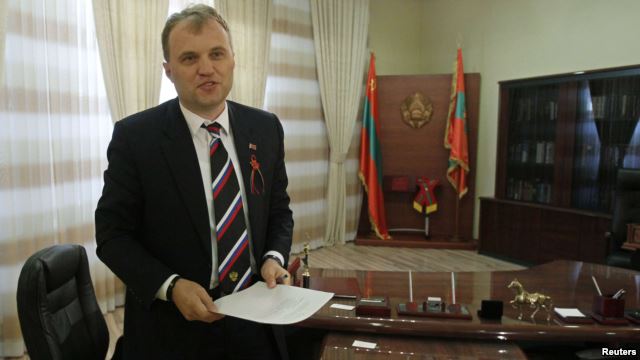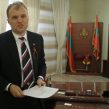
EU Draws Transnistria Closer to Avoid Looming Instability
Publication: Eurasia Daily Monitor Volume: 12 Issue: 223
By:

On November 29, Transnistria—the Russian-supported separatist region of Moldova—held parliamentary and local elections. Despite predictions to the contrary, the opposition forces won a landslide victory, claiming 31 of the 43 seats in the local legislature (Novosti Pridnestrovya, December 2). Even if unrecognized by the international community, these elections were important not only with regard to the political dynamics within Transnistria, but also due to their implications for Tiraspol-Chisinau relations as well as for the broader region. Moreover, a week later, on December 7, Transnistrian leader Yevgeny Shevchuk announced a major development on the economic front. According to Shevchuk, the European Union had decided to maintain the Autonomous Trade Preferences (ATP) regime enjoyed by Tiraspol since 2007, which was set to expire on January 1, 2016. This was presented as a major achievement of Transnistrian diplomacy. Shevchuk declared that the losses, amounting to some $30–50 million, which would have been incurred by local businesses, had thus been avoided (President.gospmr.ru, December 7).
The quarter-century-long frozen conflict in Transnistria is a stark reminder of the never-ending geopolitical tensions in the region. In the context of the war in eastern Ukraine and Moscow’s annexation of Crimea, developments in Tiraspol gained wider attention over the past two years. Russian military presence in this breakaway territory along with Russia’s continuous brinksmanship in the form of military exercises have been a particular cause for concern (RIA Novosti, December 8). Both Chisinau and Kiev are increasingly worried about potential destabilization in Transnistria, which could immediately spill over into neighboring regions of Moldova and Ukraine. Indeed, the repercussions stemming from the region’s recent parliamentary elections are seen as a potential source of such instability. The opposition party Obnovleniye, which has now gained a constitutional majority in the Transnistrian legislature, puts great strain on the local executive leadership of the separatist enclave, particularly in light of the upcoming presidential elections, scheduled for December 2016. Once headed by Shevchuk himself, Obnovleniye is today the political arm of Sheriff, the largest company and a quasi-monopoly in Transnistria, currently at odds with the presidential administration over economic as well as political influence in the region.
Against the backdrop of worsening economic conditions in Transnistria and Russia’s decreasing capacity to continue to financially prop-up the regime in Tiraspol (see EDM, June 29), Shevchuk has turned against the “enemy within”—the oligarch class, meaning first and foremost the Sheriff conglomerate. However, this strategy backfired during the last election because the presidential administration recently antagonized a large portion of the electorate by passing a 30 percent wage cut across the public sector. On the other hand, Sheriff, the largest private employer in the region, has been able to maintain competitive salaries. Ironically, the government’s anti-Sheriff campaign gave Obnovleniye a legitimacy boost in the eyes of many voters. Following the pro-Shevchuk camp’s initial attempts to challenge the election results, the administration finally accepted defeat and took a more conciliatory position (Novosti Pridnestrovya, December 8). Nonetheless, political stability in the breakaway region will now be dependent on the power-sharing negotiations between Shevchuk and Sheriff.
Importantly, Shevchuk should be able to capitalize on the EU’s decision to maintain the ATP economic benefits, which, if canceled, would have led to the potential shutting down of many local enterprises oriented toward exporting to Europe (Pervii Pridnestrovskii TV, December 7). Therefore, this reality offers him a stronger position in his government’s upcoming talks with the Sheriff-controlled parliament. In recent years, Transnistrian trade with the EU reached over 50 percent of total exports. Furthermore, according to the Romanian Embassy in Chisinau, during the first ten months of 2015, Transnistria’s exports to Romania alone amounted to $82 million, which is more than its exports to the second- and third-largest destinations—Ukraine ($42 million) and Russia ($39 million)—combined (Agora.md, December 9). The ATP extension had still not been officially confirmed by Brussels. Yet, according to Moldova’s Acting Deputy Prime Minister for Reintegration Victor Osipov: “The Transnistrian side has rushed ahead with the announcement when things are not yet entirely clear” (Teleradio-Moldova, December 9). Nonetheless, it thus appears that an implicit strategy of locking Transnistria into the European market is shaping up.
Constrained by the Kremlin, Tiraspol stood its ground, refusing to be a party to the EU-Moldova Deep and Comprehensive Free Trade Area (DCFTA) agreement, and sought a separate deal instead (Infotag.md, October 2, 2014). No separate deal was ever on the table, however. Therefore, the presumed ATP extension will buy some time for all the parties involved. Indeed, the alternative policy of canceling the existing regime and increasing tariffs on Transnistrian trade with Europe could precipitate a humanitarian crisis in the region—such an outcome could then prompt Russia to further increase its presence there. Much of the Moldovan political establishment would likely have preferred to see the ATP for Transnistria canceled altogether, hoping to cripple the region into submission. But with no elected government in place (see EDM, November 3, 4, 19, 20) and no clear strategy for further conflict resolution, Chisinau would in no way be capable of managing the aftermath of such a decision. In this context, the more pragmatic strategy on the part of the EU to provide market access to the increasingly business-oriented Transnistrian elite is more likely to pay off. Whereas, since Russia is increasingly forced to prioritize the costs of subsidizing the various separatist regimes it supports across Eurasia (see EDM, June 29), the Kremlin will probably try to seek a face-saving way out over the coming months.




